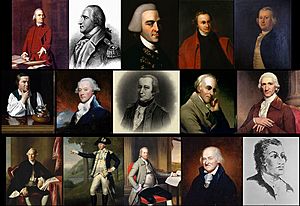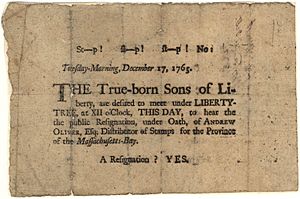Sons of Liberty facts for kids
The Sons of Liberty were a group of people in Boston at the time of the American Revolution. They were led by Samuel Adams, James Otis, and Paul Revere. Other well-known members included Benedict Arnold and Patrick Henry. They were in favor of rights of colonial Americans, which meant they often did not like the British. Some people thought the Sons of Liberty were a mob. The Sons of Liberty were the main group involved in the Boston Massacre and the Boston Tea Party.
Contents
History
In 1765, the British government needed money to afford the 10,000 officers and soldiers living in the colonies, and intended that the colonists living there should contribute. The British passed a series of taxes aimed at the colonists, and many of the colonists refused to pay certain taxes; they argued that they should not be held accountable for taxes which were decided upon without any form of their consent through a representative. This became commonly known as "No Taxation without Representation." Parliament insisted on its right to rule the colonies despite the fact that the colonists had no representative in Parliament. The most incendiary tax was the Stamp Act of 1765, which caused a firestorm of opposition through legislative resolutions (starting in the colony of Virginia), public demonstrations, threats, and occasional hurtful losses.
The organization spread hour by hour, after independent starts in several different colonies. In August 1765, the group was founded in Boston, Massachusetts. By November 6, a committee was set up in New York to correspond with other colonies. In December, an alliance was formed between groups in New York and Connecticut. January bore witness to a correspondence link between Boston and New York City, and by March, Providence had initiated connections with New York, New Hampshire, and Newport, Rhode Island. March also marked the emergence of Sons of Liberty organizations in New Jersey, Maryland, and Virginia.
In Boston, another example of violence could be found in their treatment of local stamp distributor Andrew Oliver. They burned his effigy in the streets. When he did not resign, they escalated to burning down his office building. Even after he resigned, they almost destroyed the whole house of his close associate Lieutenant Governor Thomas Hutchinson. It is believed that the Sons of Liberty did this to excite the lower classes and get them actively involved in rebelling against the authorities. Their actions made many of the stamp distributors resign in fear.
The Bostonian branch of the Sons of Liberty were responsible for organizing and executing the famous Boston Tea Party of 1773 in response to the Tea Act.
Early in the American Revolution, the former Sons of Liberty generally joined more formal groups, such as the Committee of Safety.
The Sons of Liberty popularized the use of tar and feathering to punish and humiliate offending government officials starting in 1767. This method was also used against British Loyalists during the American Revolution. This punishment had long been used by sailors to punish their mates.
New York
In December 1773, a new group calling itself the Sons of Liberty issued and distributed a declaration in New York City called the Association of the Sons of Liberty in New York," which formally stated that they were opposed to the Tea Act and that anyone who assisted in the execution of the act was "an enemy to the liberties of America" and that "whoever shall transgress any of these resolutions, we will not deal with, or employ, or have any connection with him."
After the end of the American Revolutionary War, Isaac Sears, Marinus Willet, and John Lamb in New York City revived the Sons of Liberty. In March 1784, they rallied an enormous crowd that called for the expulsion of any remaining Loyalists from the state starting May 1. The Sons of Liberty were able to gain enough seats in the New York assembly elections of December 1784 to have passed a set of punitive laws against Loyalists. In violation of the Treaty of Paris (1783), they called for the confiscation of the property of Loyalists. Alexander Hamilton defended the Loyalists, citing the supremacy of the treaty.
Flags
In 1767, the Sons of Liberty adopted a flag called the rebellious stripes flag with nine vertical stripes, four white and five red. A flag having 13 horizontal red and white stripes was used by Commodore Esek Hopkins (Commander-in-Chief of the Continental Navy) and by American merchant ships during the war. This flag was also associated with the Sons of Liberty. Red and white were common colors of the flags, although other color combinations were used, such as green and white or yellow and white.
Notable Sons of Liberty

Not pictured: Hercules Mulligan, Thomas Melvill, Isaac Sears
Boston
- Samuel Adams – political writer, tax collector, cousin of John Adams, fire warden. Founded the Sons Of Liberty
- Benjamin Church (physician) - first Surgeon-General of the United States Army and known traitor. Banished from Massachusetts in 1778.
- Benjamin Edes – journalist/publisher Boston Gazette
- Benjamin Kent - Attorney General
- John Hancock – merchant, smuggler, fire warden
- James Otis – lawyer, Massachusetts
- Paul Revere – silversmith, fire warden
- James Swan – financier
- Isaiah Thomas – printer, Boston then Worcester, first to read Declaration of Independence in Massachusetts
- Joseph Warren – doctor, soldier
- Thomas Young – doctor
New York
- Joseph Allicocke – One of the leaders of the Sons, and possibly of African ancestry.
- John Lamb – trader
- Alexander McDougall – captain of privateers
- Hercules Mulligan – haberdasher, spy under George Washington for the Continental Army, friend of Alexander Hamilton
- Isaac Sears – captain of privateers
- Haym Salomon – financial broker, New York and Philadelphia
- Marinus Willett - militia officer, cabinet maker, student
Other
- Benedict Arnold – businessman, later General in the Continental Army and then the British Army
- Timothy Bigelow – blacksmith, Worcester, Massachusetts
- John Brown – business leader of Providence, Rhode Island
- Samuel Chase – signer of the Declaration of Independence
- John Crane – carpenter, colonel in command of the 3rd Continental Artillery Regiment, Braintree, Massachusetts
- William Ellery – signer of the Declaration of Independence
- Christopher Gadsden – merchant, Charleston, South Carolina
- Patrick Henry – lawyer, Virginia
- Jedediah Huntington - General in the Continental Army
- William Paca – signer of the Declaration of Independence
- Charles Willson Peale – portrait painter and saddle maker, Annapolis, Maryland
- Matthew Phripp – merchant, chairman of the Norfolk committee of safety, prominent Freemason, and colonel of the militia. Norfolk, Virginia
- Benjamin Rush – physician, Philadelphia
- Charles Thomson – tutor, secretary, Philadelphia
- William Williams – signer of the Declaration of Independence
Later societies
At various times, small secret organizations took the name "Sons of Liberty.” They generally left very few records. Bennington, Vermont had an organization named the Sons of Liberty in the early 1800s that included local notables such as military officer Martin Scott and Hiram Harwood.
The Improved Order of Red Men (estab. 1834) claimed to be descendants of the original Sons of Liberty, noting that the Sons participated in the Boston Tea Party dressed as their idea of "Indians".
The name was also used during the American Civil War. By 1864, the Copperhead group the Knights of the Golden Circle set up an offshoot called Order of the Sons of Liberty. They both came under federal prosecution in 1864 for treason, especially in Indiana.
See also
 In Spanish: Hijos de la Libertad para niños
In Spanish: Hijos de la Libertad para niños


